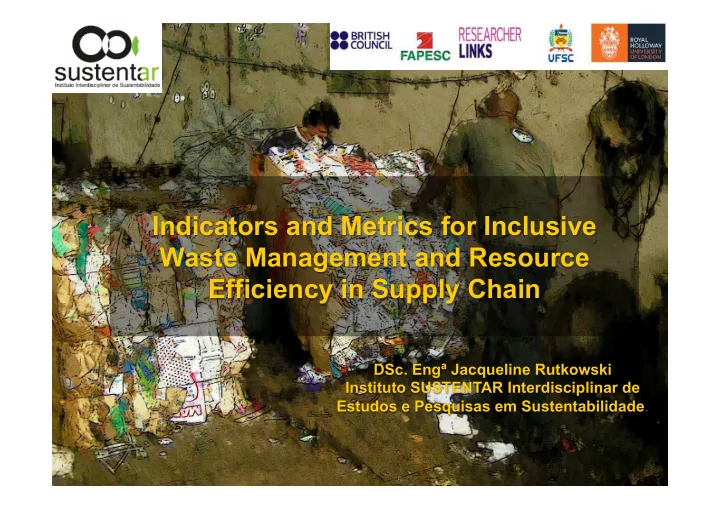

Indicators and Metrics for Inclusive Waste Management and Resource Efficiency in Supply Chain DSc. Engª Jacqueline Rutkowski Instituto SUSTENTAR Interdisciplinar de Estudos e Pesquisas em Sustentabilidade . .
Who am I? – Professor at Federal University of Ouro Preto Industrial Engineering Dept/ UFOP (un?l 2005) – Ac?on-researcher associated to SUSTENTAR Ins?tute - Interdisciplinary Studies and Research in Sustainability, a technical-scien?fic NGO which objec?ve is to systema?ze, develop and disseminate Social Technologies to support Sustainability – Informal Recycling Sector ; – Waste recycling, Sustainability, Solidary Economy, Par?cipatory methodologies ; – Directress of CMRR – Centre of Reference in Recycling, Environmental Founda?on (FEAM), Minas Gerais Government
Inc Inclu lusive a and nd S Soli lidary R y Recycli ling ng Observat Obser ator ory Núcleo Alter N ativas de Produção/ UFMG DRS/ -MG N ET ORK TO TO BUIL UILD SOLUT IONS TO TO WA WASTE RECYCLIN ING AS AS A SOCIA IAL ETWORK UTIO AND ENVIR IRONMENTAL ALTERNATIV IVE FO FOR UR URBAN WA WASTE TR NT AN TREATME TMENT FROM THEORETICAL AND PRACTICAL KNOWLEDGE
PR PRODUCTI DUCTIVE CHAI AIN OF OF REC RECYCLED LED PAP APER Service C Cha hain Value C Va Cha hain WP fundamental actor, but the most fragile of the Value and the Service Recycling Chains
Solidary Selective Waste Collection: one Social Technology Waste pickers ask people to separate recyclables from waste and collect the material on a specific day of week, taking them to their sheds. In this contact, they teach citizens about what is or is not recyclable, and mobilise them to separate, once this will become an income to a waste pickers family.
Solidary Selective Waste Collection: one Social Technology Waste pickers organize themselves as collective enterprises - cooperatives and associations - and so they can be contracted by municipalities as part of the solid waste management systems. In their sheds, the waste pickers sort manually the recyclables (plastics, metals, glass and papers) and prepare pressed bales, selling them to middlemen, that finally sell the material to the industry.
Solidarity Selec?ve Collec?on ü RUTKOWSKI,JE.&RUTKOWSKI,EW. Expanding worldwide urban solid waste recycling: The Brazilian social technology in waste pickers inclusion. Waste Management&Research, Vol. 33(12) 1084.-1093 2015 ü Rutkowski, J.E., Lima, F. P.A., Oliveira ,F.G. Improvement of urban solid waste management through recycling incen?ves: a methodology for more sustainable ci?es. ISWA Congress, Viena, 2013. Descrip?on of the model /processes and main metrics: understanding and organizing the processes and results of the waste pickers' work as private service providers in municipal waste management at Brazilian ci?es.
Solidary Seletive Collection: better environmental results, more material recycled, less waste into landfill Londrina: CSS; Belo Horizonte: private cleaning enterprise. 8
Solidary Selec,ve Collec,on (SoCo) Assessment Tool
Recycling of solid waste Ø RUTKOWSKI, J. E.; VARELLA, C. V. S.; CAMPOS, L. S.Recycling of municipal solid waste in Brazil: challenges and opportuni?es for expansion, ISWA Congress, SP/SP, 2014. Ø "Analysis of the Produc?ve Chain of Recyclable Materials in Brazil“, Research Report, 2013.
REC T2 REV REC T1 INTERMEDIARIES , SEMI- WASTE PICKERS, WRECKER , BROKERS , COOPERATIVES, MANUFACTURED WASTEPAPER PUBLIC SORTING INDUSTRY WHOLESALERS PLANTS - Screening - Screening - Washing - Collec?on - Sor?ng - Screening - Milling/flakes - Packing - Extrusion/ pellets - Packing - Marke?ng - Trading - Dissolu?on - Transport - Depura?on - Transport - Pulp modelling/ drying - Marke?ng TRANSF - Differents MANUFACTU- manufacturing PLASTICS RED processes (flakes and PLASTICS INDUSTRY (extrusion, injec?on, pellets) blowing, drying PAPER compression, etc) PAPER(paper board)
Conclusions • The geographical concentra?on of recycling industry diminishes recyclable material prices, does not allow trading some materials and jus?fies the ac?on of midlemen; • A segmented and oligopsonic market with several actors that plays different roles and have specific needs; • Many informal actors and great varia?on on recyclable material prices with raw recycled materials prices linked to global commodi?es prices; • The Waste pickers Coopera?ves organized on solidarity economy, the produc?ve chain organized on capitalist principles : it is necessary to build strategies and tools to promote this dialogue and rela?onship; • Lack of public programs to promote waste recycling; • Most important bokleneck is Selec?ve Collec?on of solid waste;
Ci Circu cular Econom Economy
CE and recycling of solid waste Ø RUTKOWSKI J., PURSHOUSE H. , VELIS C., RUTKOWSKI E.,LERPINIERE, D., Waste Sor?ng Social Technology in Brazilian Informal Materials Recovery Facili?es – in progress (comparing results Brazil (“informal”) and UK MRF)
From now... • Understanding the links and results of waste pickers’ work in the recovery of resources • To describe and to assess the contribu?on of the inclusive waste management on implemen?ng Circular Economy • To perceive the influence of the waste pickers' work on the climate change indicators and how inclusive waste management collaborate to resilient ci?es • Informal recycling sector and Zero Waste ini?a?ves and Funcionality Economy (ORIS)
Thank you for listening !!! Jacqueline.rutkowski@gmail.com
Recommend
More recommend